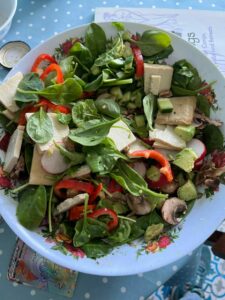What we see here in the picture, folks, is our new “olive cellar”, containing – yes – FIFTEEN jars of olives!
We used different recipes for the olives. About half of them are what we call here zeitim dfukim – olives that were broken so their pickling will be more thorough and take longer. The other half we left whole. The solution is salt water, and the spices include fresh lemons, spicy red peppers, black peppers, mustard seeds, and occasionally garlic and rosemary and red wine vinegar. We still don’t know how they are going to come out, but we’ll keep you posted.

What we see here is a jar with layers of olives, lemons, peppers etc. Here’s the way we did it:
1. We let the olives sit in water for four days, changing the water every day.
2. We washed the jars well (some folks even boil them to sanitize)
3. We cut about one lemon per jar into eight pieces. We peeled some garlic cloves and made a small dent in them with a knife. We prepared bay leaves, black unground pepper, mustard seeds, and rosemary twigs next to the spicy red peppers, lemons and garlic.
4. We placed two or three lemon slices and a hot pepper at the bottom of the jar, then layered with olives.
5. Then, we placed one or two bay leaves (per jar) and some of the other spices, depending on what we wanted the jar to be like. Then put some more olives, and so on and so forth.
6. With some jars, we added about a third of a cup good quality wine vinegar.
7. We placed an egg inside a large pot and filled the pot with water (the egg sank to the bottom). We started adding salt – about 1 tablespoon per cup of water – and mixing it with the water. Whoa! The egg started floating! That meant the solution was ready.
8. We filled the jar with salt water, on top of the olives.
9. We “sealed” the olives with a thin layer of olive oil on top.
10. We closed and sealed the jar, and put it in a dark, cold place (poor olives).
Now we wait.
And here at the blog, it’ll be back to our previously scheduled programs.




No comment yet, add your voice below!